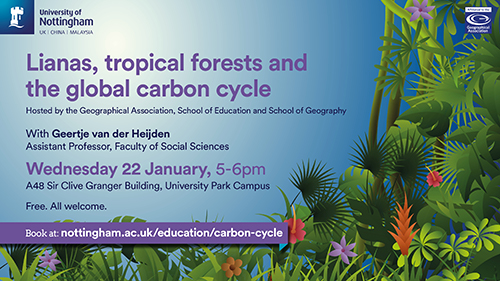
Hosted by the Nottingham branch of the Geographical Association - School of Education and School of Geography
Presented by Geertje van der Heijden, Assistant Professor, Faculty of Social Sciences
In this lecture, I will explore the functioning of the carbon cycle and indicate its importance in mitigating some of the effects of human-induced increases in atmospheric CO2 concentrations. In particular, the lecture will provide a focus on the role of lianas (woody climbing plants) on the carbon cycle and balance of tropical forests. Using examples from a large scale liana removal experiment in Panama, I will show that lianas severely reduce the ability of tropical forests to store and uptake carbon by decreasing tree growth and increasing tree mortality and show that an increase in lianas will potentially have global consequences for the rate of climate change.
Biography
Geertje van der Heijden is interested in how climate change affects the structure and functioning of tropical forests and the ability of tropical forests to store and sequester carbon. In particular, her research focuses on lianas (woody vines). Lianas are a characteristic life form of tropical forests where they peak in abundance and diversity. They are classed as structural parasites, which means they use trees to support their biomass to reach the canopy. As competition with lianas is stronger than competition between trees, trees infested with lianas suffer from reduced growth, survival rates and fertility. On a forest-level, this means that lianas can reduce the amount of carbon that is stored and sequestered by tropical forests. In previous research, using a liana removal experiment in Panama, we have shown that this can be by as much as 76% (van der Heijden et al. 2015), which indicates lianas can have severe impacts on the carbon sink function of tropical forests. As lianas are increasing in Neotropical forests, which is potentially driven by direct and indirect of climate change, this increase in liana dominance and associated impacts on the carbon sink function of tropical forests need to be taken into account to better understand the fate of tropical forests and their carbon balance in a changing climate.
School teachers are encouraged to bring A level students.
Refreshments will be provided after the lecture and there will be an opportunity for informal conversation with University Tutors.
When registering for this event, we will collect personal data from you. This information will not be passed outside of the University of Nottingham. Please read our privacy information for more detail about how we use data.